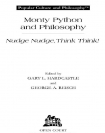Monty Python and Philosophy, Gary Hardcastle [portable ebook reader TXT] 📗

- Author: Gary Hardcastle
Book online «Monty Python and Philosophy, Gary Hardcastle [portable ebook reader TXT] 📗». Author Gary Hardcastle
A later scene from Monty Python and The Holy Grail asserts that God not only sanctions the earthly destruction of His enemies, but provides the instruments to do so. When the knights are confronted by the killer rabbit that has savagely attacked members of the party, and more importantly, interfered with the mission ordered by God, the rabbit must be annihilated, in His holy name. As the knights prepare to unleash the Holy Hand Grenade, which has been blessed for such use by God Himself, an assistant cleric (Michael Palin) offers the following reading from the Book of Armaments, Chapter 2:
And Saint Attila raised the hand grenade up on high, saying “O Lord, bless this thy hand grenade, that with it thou mayest blow thine enemies to tiny bits, in Thy mercy.” And the Lord did grin.
Evidently no job is too small when it comes to eliminating God’s opponents. God needs his defenders of the faith to overcome whatever sentiments they may have for killing women and rabbits if His will is to be done. The case of the rabbit is not at all ambiguous. This vicious little bunny was caught red-handed (get it?) in the act of multiple assault and homicide and should be terminated with extreme prejudice to prevent any further interference with holy missions and serve as deterrent to other rabbits. There is some doubt about whether the woman is actually a witch, but it is better to err on the side of safety. The risk is greater if the mob releases the woman only to discover later that she is a witch, than to burn her only to learn that she was not. So logically it is better to burn the woman on the chance that she might be a witch. If the mob is wrong, there is no harm done. The woman simply receives her Heavenly reward61 ahead of schedule. Besides, she might have been chucked into Hell anyway.
The mob of stoners in Monty Python’s Life of Brian and the knights that destroy the rabbit in Monty Python and the Holy Grail believe that their actions are just because they are sanctioned by God, which further implies that any action sanctioned by God is for that reason just.
The question raised by the Pythons of whether an act which seems unjust is nevertheless just if sanctioned by God is an ancient problem. In fact, the topic is the subject of a Socratic dialogue called the Euthyphro. Socrates meets Euthyphro in the city’s center and learns that the young man has come to indict his own father because, Euthyphro insists, it is the pious thing to do. When Socrates challenges him to define piety, Euthyphro asserts that piety is that which is loved by the gods. Socrates asks whether a given act is pious because it is loved by the gods, or whether it is loved by the gods because it is pious. The same question is applicable to justice. Another way to put the question is to ask whether justice is determined by God and dependent upon God, or whether justice is embraced by God but independent of God. The former construction, which Euthyphro, the stoners and the knights evidently support, is problematic because it asserts that any action, no matter how monstrous it may seem, is just if authorized by God.
The examples of the witch and rabbit demonstrate why the character of God is so important. If God is angry and vengeful and orders the earthly destruction of His enemies, then it would seem that He is capable of ordering acts considered wicked. On the other hand, if God is perfect, and human characteristics and weaknesses are not applicable to Him, then wickedness cannot be performed in His name and cannot be attributed to Him.
Prayer (A Euphemism for Butt-Kissing and Begging)
In Monty Python’s The Meaning of Life, Part II: Growth and Learning, the Python troupe has a little fun with church prayer. After some informational remarks by John Cleese, Michael Palin formally tells the congregation, “Let us praise God,” and leads them in the following prayer, which they dutifully repeat.
Oh, Lord. Ooh, you are so big. So absolutely huge. Gosh, we’re all really impressed down here, I can tell you. Forgive us, O Lord, for this our dreadful toadying. [Congregation] And barefaced flattery. But you’re so strong and, well, just so super. [Congregation] Fantastic. Amen.
Believers are expected to constantly acknowledge the greatness of God. This form of prayer includes giving thanks to God for all He has given us. We are not only appreciative of the products and services we receive, but for our very lives, which persist only because of His will. Refusal to give thanks is not merely impolite, but the worst form of ingratitude. Even those in pain and misery must not appear ungrateful, for that too comes from God. These sorts of prayers imply that God wants and needs human praise, and never tires of hearing about His infinite might and goodness from His humble servants. Apparently God has an insatiable ego that centuries of worship have not satisfied and requires His followers to forever stand in awe of His magnificence. Believers must utter every word with passion or risk falling out of His favor and being, that’s right, chucked into Hell. The congregation’s acknowledgement of “barefaced flattery” conveys their recognition that God must be aware





Comments (0)